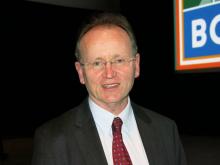User login
A combination drug regimen of sofosbuvir plus the investigational medication GS-5816 yielded high rates of sustained viral response to treatment among patients with genotype 3 hepatitis C virus infection without cirrhosis, according to new research.
Study results, taken from the phase II ELECTRON2 study, showed the combination of drugs with or without ribavirin led to SVR rates of 88% to 100% after 12 weeks. Previous work had shown the drug combination to be effective in 12 weeks across all genotypes 1-6.
Investigators led by Dr. Edward J. Gane, professor of medicine at the University of Auckland, New Zealand, and deputy director of the New Zealand Liver Transplant Unit at Auckland City Hospital, randomized 104 treatment-naive patients to receive one of four drug regimens: sofosbuvir (SOF) plus 25 mg of GS-5816; SOF, 25 mg of GS-5816, and ribavirin; SOF plus 100 mg of GS-5816; or SOF, 100 mg of GS-5816, and ribavirin. Most participants were male, white, and had IL28B non-CC genotype. Two patients did not complete the study.
Adverse events, which were more common in the ribavirin arm, were generally mild, the authors said. Grade 3/4 laboratory abnormalities were infrequent and consistent with the ribavirin safety profile.
“These data support further development of SOF in combination with GS-5816 but without ribavirin for the treatment of chronic HCV,” the authors said at the annual meeting of the American Association for the Study of Liver Diseases.
The trial was sponsored by Gilead Sciences, manufacturer of the drugs. Dr. Gane has served on an advisory board for and has received speaking fees from the company. All but one coauthor either is employed by Gilead or has received speaking fees from the company.
A combination drug regimen of sofosbuvir plus the investigational medication GS-5816 yielded high rates of sustained viral response to treatment among patients with genotype 3 hepatitis C virus infection without cirrhosis, according to new research.
Study results, taken from the phase II ELECTRON2 study, showed the combination of drugs with or without ribavirin led to SVR rates of 88% to 100% after 12 weeks. Previous work had shown the drug combination to be effective in 12 weeks across all genotypes 1-6.
Investigators led by Dr. Edward J. Gane, professor of medicine at the University of Auckland, New Zealand, and deputy director of the New Zealand Liver Transplant Unit at Auckland City Hospital, randomized 104 treatment-naive patients to receive one of four drug regimens: sofosbuvir (SOF) plus 25 mg of GS-5816; SOF, 25 mg of GS-5816, and ribavirin; SOF plus 100 mg of GS-5816; or SOF, 100 mg of GS-5816, and ribavirin. Most participants were male, white, and had IL28B non-CC genotype. Two patients did not complete the study.
Adverse events, which were more common in the ribavirin arm, were generally mild, the authors said. Grade 3/4 laboratory abnormalities were infrequent and consistent with the ribavirin safety profile.
“These data support further development of SOF in combination with GS-5816 but without ribavirin for the treatment of chronic HCV,” the authors said at the annual meeting of the American Association for the Study of Liver Diseases.
The trial was sponsored by Gilead Sciences, manufacturer of the drugs. Dr. Gane has served on an advisory board for and has received speaking fees from the company. All but one coauthor either is employed by Gilead or has received speaking fees from the company.
A combination drug regimen of sofosbuvir plus the investigational medication GS-5816 yielded high rates of sustained viral response to treatment among patients with genotype 3 hepatitis C virus infection without cirrhosis, according to new research.
Study results, taken from the phase II ELECTRON2 study, showed the combination of drugs with or without ribavirin led to SVR rates of 88% to 100% after 12 weeks. Previous work had shown the drug combination to be effective in 12 weeks across all genotypes 1-6.
Investigators led by Dr. Edward J. Gane, professor of medicine at the University of Auckland, New Zealand, and deputy director of the New Zealand Liver Transplant Unit at Auckland City Hospital, randomized 104 treatment-naive patients to receive one of four drug regimens: sofosbuvir (SOF) plus 25 mg of GS-5816; SOF, 25 mg of GS-5816, and ribavirin; SOF plus 100 mg of GS-5816; or SOF, 100 mg of GS-5816, and ribavirin. Most participants were male, white, and had IL28B non-CC genotype. Two patients did not complete the study.
Adverse events, which were more common in the ribavirin arm, were generally mild, the authors said. Grade 3/4 laboratory abnormalities were infrequent and consistent with the ribavirin safety profile.
“These data support further development of SOF in combination with GS-5816 but without ribavirin for the treatment of chronic HCV,” the authors said at the annual meeting of the American Association for the Study of Liver Diseases.
The trial was sponsored by Gilead Sciences, manufacturer of the drugs. Dr. Gane has served on an advisory board for and has received speaking fees from the company. All but one coauthor either is employed by Gilead or has received speaking fees from the company.
FROM THE LIVER MEETING 2014
Key clinical point: Sofosbuvir plus GS-5816 was well tolerated and achieved high SVR rates among treatment-naive patients with chronic genotype 3 HCV infection without cirrhosis.
Major finding: The therapy achieved SVR rates of 88%-100% after 8 weeks.
Data source: Results from 104 participants in the phase II ELECTRON2 study.
Disclosures: The trial was sponsored by Gilead Sciences, manufacturer of the drugs. Dr. Gane has served on an advisory board for and has received speaking fees from the company. All but one coauthor either are employed by Gilead or have received speaking fees from the company.
